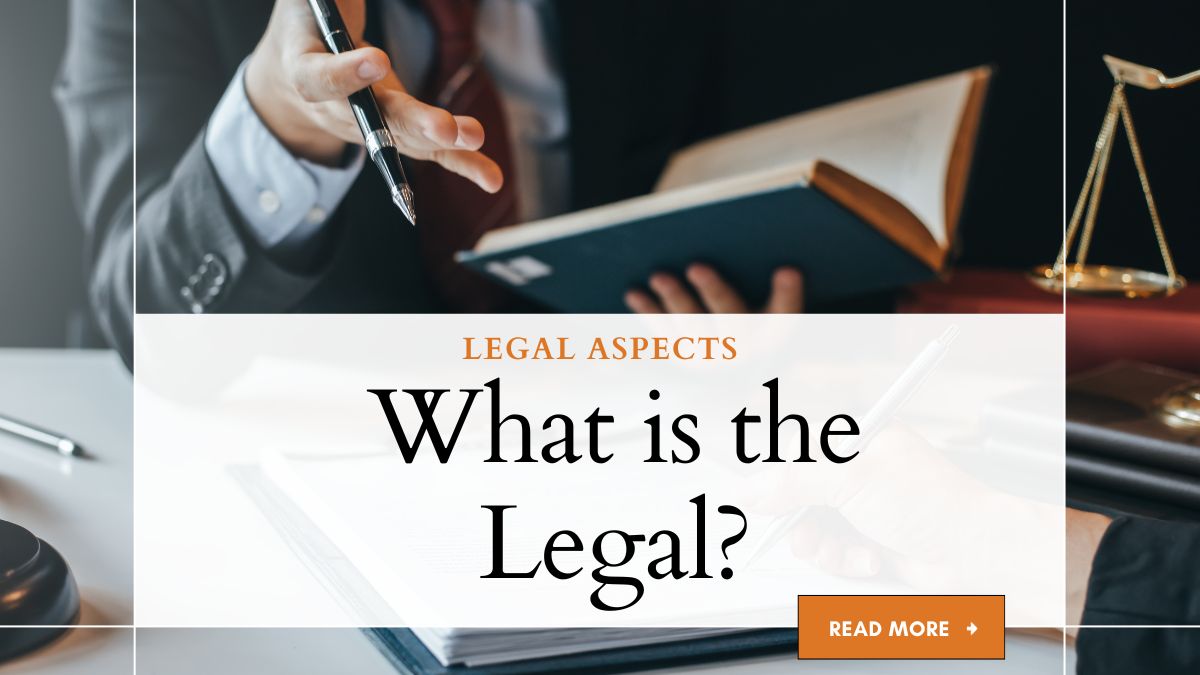
In our quest to navigate the complexities of society, one question often arises: What is the Legal? Understanding Law in Our Lives is not just about recognizing rules and regulations but about comprehending the foundation upon which our societies stand and function.
This article embarks on an enlightening journey into the realm of law, unraveling how legal systems have evolved over time and the myriad ways they intertwine with every facet of our daily lives.
From the intricacies of criminal and civil law to the profound impact of international legislation, we delve deep into the legal labyrinth, uncovering how law shapes our world, governs our interactions, and continuously molds the fabric of our collective existence.
Also, you can able to know,
The Framework of Law
Understanding the foundation of our legal systems is crucial for grasping how laws govern our lives.
This section explores the intricate processes that shape our legal framework, including how laws are crafted and the pivotal role constitutions play in molding legal landscapes across nations.
Understanding Legislation: How Laws are Made
The legislative process is a cornerstone of democratic governance, embodying principles of representation and deliberation.
This section delves into the intricate processes through which laws are conceived, debated, and enacted.
It explores the roles of various governmental bodies in law-making, the checks and balances that ensure fairness and efficacy, and the complex interplay between societal needs, political ideologies, and legislative outcomes.
By demystifying the legislative process, readers gain an appreciation for the intricate balance of power and responsibility that shapes the laws governing their lives.
The Role of Constitutions in Shaping Legal Systems
Constitutions serve as the bedrock of national legal systems, enshrining the fundamental principles and values upon which societies are built.
This segment examines how constitutions, through their provisions, establish the framework for governance, protect individual rights, and define the scope and limits of governmental power.
By analyzing various constitutional models – from rigid to flexible, from federal to unitary – this part highlights the diversity in how different nations structure their legal and political systems, reflecting a range of historical contexts, cultural values, and societal aspirations.
Different Types of Law
The legal world is diverse, encompassing various branches each with its unique focus and application.
This section delves into the key differences between criminal, civil, public, private, and international law, illustrating how each type influences different aspects of society and governance.
Criminal vs. Civil Law: Key Differences
The distinction between criminal and civil law is pivotal in understanding the legal landscape.
This section explores the fundamental differences in purpose, process, and parties involved in these two branches of law.
Criminal law, dealing with offenses against the state or society, focuses on punishment and deterrence, while civil law resolves disputes between individuals or entities, aiming for restitution or resolution.
By dissecting case examples and procedural differences, this part illuminates the distinct roles these two types of law play in maintaining societal order and resolving disputes.
Public Law vs. Private Law: Exploring the Dichotomy
The dichotomy between public and private law represents two distinct realms of legal interaction.
Public law governs the relationship between individuals and the state, encompassing areas like administrative and constitutional law, whereas private law deals with legal relationships between individuals, covering domains such as contracts and torts.
This exploration discusses how these two spheres of law function, their interrelation, and their impact on everyday life, providing readers with a clearer understanding of how legal principles operate in different contexts.
International Law: Governing Relations Between States
International law, the set of rules and agreements that bind states and other international actors, plays a crucial role in maintaining global order.
This section delves into the principles of international law, examining how treaties, customary laws, and international organizations contribute to peaceful coexistence and cooperation among nations.
It discusses the challenges of enforcement and compliance in an international system based on sovereignty and the evolving nature of international law in response to global issues like human rights, environmental protection, and cyber security.
The Court System
Courts are the pillars of the legal process, upholding the rule of law. This section examines the multi-layered court system, the crucial roles of judges and juries, and how different levels of courts from local to supreme contribute to administering justice.
How Courts Uphold the Law
Courts are the guardians of legal justice, interpreting and applying laws to individual cases.
This section examines the role of courts in the legal system, discussing how they function as arbiters of disputes, interpreters of legislation, and upholders of constitutional values.
It explores the significance of judicial independence, the concept of precedent in common law systems, and the impact of judicial decisions on societal norms and legal principles.
By understanding how courts operate, readers can appreciate the integral role these institutions play in maintaining the rule of law and delivering justice.
Different Levels of Courts: From Local to Supreme
The hierarchical structure of court systems is essential for the administration of justice.
This part outlines the various levels of courts, from local tribunals that handle minor matters to supreme courts that decide on significant legal questions.
It explains the jurisdiction and function of different court levels, the concept of appellate review, and the importance of a multi-tiered court system in ensuring fair and comprehensive adjudication of legal issues.
This section also touches on specialized courts, highlighting how legal systems cater to specific areas like family law, bankruptcy, and administrative disputes.
The Role of Judges and Juries in Legal Proceedings
Judges and juries are fundamental to the judicial process, each playing a distinct role in the pursuit of justice.
This segment delves into the responsibilities and functions of judges and juries, discussing how judges oversee legal proceedings, make rulings on points of law, and, in some cases, determine verdicts and sentences.
It contrasts this with the role of juries, primarily in common law jurisdictions, in ascertaining facts and delivering verdicts.
This exploration highlights the balance between legal expertise and community participation in the judicial process, emphasizing the significance of these roles in upholding justice.
Legal Professionals
Legal professionals are the executors of law. This section highlights the roles and responsibilities of attorneys, paralegals, and judges, demonstrating how each contributes to the legal process and upholds the principles of justice.
Attorneys: Advocates of the Law
Attorneys, or lawyers, are vital in navigating the complexities of the legal system. This section explores the multifaceted role of attorneys, from providing legal advice and representation to advocating for clients in court. It discusses the ethical obligations and standards that govern the legal profession, the importance of attorney-client privilege, and the diverse specializations within the legal field, from criminal defense to corporate law.
This part aims to shed light on the crucial role attorneys play in advocating for justice and guiding clients through the intricacies of legal processes.
The Crucial Role of Paralegals
Paralegals play an indispensable role in the legal profession, providing essential support to attorneys and contributing significantly to the efficient functioning of legal services.
This segment focuses on the responsibilities of paralegals, including legal research, document preparation, case management, and client interaction.
It highlights the skills and expertise required to excel in this role and discusses the evolving scope of paralegal work in the face of technological advancements and changing legal landscapes.
This section underscores the value of paralegals in enhancing the quality and accessibility of legal services.
Judges: Interpreters and Enforcers of Law
Judges are pivotal figures in the legal system, entrusted with the responsibility of interpreting and applying the law.
This part examines the role of judges in various legal systems, their processes in decision-making, and the impact of their judgments on legal precedent and societal norms.
It discusses the qualities of impartiality, integrity, and legal expertise essential for judges and explores the mechanisms in place to ensure accountability and ethical conduct.
By understanding the role of judges, readers gain insight into the critical balance between legal knowledge, ethical considerations, and judicial discretion in the pursuit of justice.
Human Rights and Law
Human rights are integral to legal systems worldwide. This section focuses on understanding basic legal rights and how laws are structured to protect these rights, emphasizing the intersection of law and human dignity.
Understanding Your Basic Legal Rights
Human rights are fundamental entitlements inherent to all individuals, regardless of nationality, residence, sex, national or ethnic origin, color, religion, language, or any other status.
This section provides a comprehensive overview of basic human rights as defined by international law, including the right to life, freedom of speech, freedom from torture, and the right to a fair trial.
It discusses the legal frameworks that protect these rights and the challenges in enforcing them across different jurisdictions.
Understanding basic legal rights is crucial for individuals to recognize and advocate for their entitlements and to hold governments accountable for their protection.
How Laws Protect Human Rights
The protection of human rights is a fundamental aspect of legal systems worldwide.
This section delves into how laws at both national and international levels safeguard human rights.
It explores the role of constitutional provisions, legislation, and international treaties in establishing legal protections against human rights abuses.
The discussion extends to the mechanisms and institutions, such as courts and human rights organizations, that enforce these laws and provide remedies for violations.
By examining the intersection of law and human rights, this part highlights the ongoing efforts and challenges in upholding human dignity and freedom in diverse legal and cultural contexts.
Criminal Law in Detail
Criminal law deals with conduct considered harmful or dangerous to society. This section provides a detailed look into what constitutes a crime and the procedural journey of criminal justice, from definition to prosecution.
Defining Crime: A Legal Perspective
Understanding what constitutes a crime is pivotal in comprehending the criminal justice system.
This section defines crime from a legal standpoint, discussing the essential elements that constitute a criminal act, including mens rea (criminal intent) and actus reus (criminal act).
It explores various categories of crimes, ranging from minor offenses to major felonies, and discusses the legal principles that guide the determination and categorization of criminal behavior.
This exploration provides a foundational understanding of how criminal law distinguishes between different types of unlawful activities and the legal implications of these distinctions.
The Process of Criminal Justice
The criminal justice process is a complex journey from the commission of a crime to the final verdict and sentencing.
This section outlines each stage of this process, including investigation, arrest, charging, trial, and sentencing.
It discusses the rights of the accused at each stage, the roles of law enforcement, prosecutors, defense attorneys, and the judiciary in ensuring a fair and just process.
The section also touches upon alternative dispute resolution methods and rehabilitation efforts, offering a holistic view of the criminal justice system.
This comprehensive overview aims to demystify the steps involved in criminal proceedings, highlighting the balance between upholding justice, protecting society, and ensuring the rights of the accused.
Civil Law Explained
Criminal law deals with conduct considered harmful or dangerous to society. This section provides a detailed look into what constitutes a crime and the procedural journey of criminal justice, from definition to prosecution.
Understanding Civil Litigation
Civil litigation encompasses the legal process for resolving non-criminal disputes between individuals or entities.
This section outlines the stages of civil litigation, from the initiation of lawsuits through pleadings to the discovery process, trial, and potential appeal.
It explains the burden of proof, the role of evidence, and the procedures that guide these civil cases.
This exploration aims to clarify how civil litigation provides a formal framework for resolving disputes over contracts, torts, property, and family matters, ensuring that legal remedies are available to address grievances and enforce rights.
Common Types of Civil Cases
This part provides an in-depth look at the various categories of civil law cases, such as contract disputes, personal injury claims, property disputes, and family law matters.
It discusses the nuances of each type of case, the legal principles that govern them, and typical resolutions.
By exploring these common civil cases, readers can gain a clearer understanding of how civil law operates in practice and how it affects individuals and businesses in their everyday interactions and agreements.
Family Law: A Closer Look
Family law addresses legal issues within familial relationships. This section delves into marriage, divorce, and the legal implications they carry, along with a focus on laws surrounding child custody and support.
Marriage, Divorce, and Legal Implications
Family law, a crucial aspect of civil law, deals with issues related to family relationships.
This section examines the legal aspects of marriage, including the requirements for a valid marriage, the rights and responsibilities it entails, and the processes involved in divorce, such as asset division, alimony, and child support.
It provides insights into how the law seeks to manage and resolve the complex emotional and financial issues that arise in the context of family life.
Child Custody and Support Laws
The well-being of children is at the heart of family law. This part delves into child custody arrangements, discussing how courts determine custody based on the best interests of the child, and the factors considered in these decisions.
It also covers child support, outlining how support amounts are calculated and enforced.
This section highlights the legal efforts to balance the rights and responsibilities of parents while prioritizing the health, safety, and welfare of children in family law disputes.
Business and Corporate Law
This section explores the legal frameworks that underpin business operations and corporate governance, discussing the foundational aspects and the importance of laws in protecting innovations and intellectual property.
Legal Foundations of Business Operations
Business and corporate law forms the backbone of commercial activity, providing the legal framework for companies and businesses to operate.
This section explores the various legal structures available for businesses, the process of incorporation, and the legal obligations and protections these structures provide.
It also discusses the regulatory environment for businesses, including compliance with laws related to employment, consumer protection, and competition.
This overview is essential for anyone involved in or considering starting a business, offering a roadmap of the legal landscape that underpins commercial operations.
Intellectual Property Law: Protecting Innovation
Intellectual property law plays a critical role in the modern economy by protecting the rights of creators and innovators.
This section examines the various types of intellectual property, such as patents, copyrights, trademarks, and trade secrets, and the legal mechanisms in place to safeguard these assets.
It discusses the importance of intellectual property rights in encouraging innovation and creativity and the challenges posed by infringement and enforcement in a globalized market.
This part offers valuable insights into how businesses and individuals can protect their creative and intellectual investments.
Property Law Essentials
Property law is a cornerstone of legal transactions and rights. This section covers the fundamental concepts of property law, including ownership rights and the legal intricacies involved in buying and selling real estate.
Understanding Ownership Rights
Property law governs the rights and responsibilities related to the ownership and use of property.
This section explains the legal concepts underlying property rights, including the distinction between real and personal property, the various forms of property ownership, and the transfer of property rights.
It also covers issues such as easements, zoning laws, and eminent domain. This comprehensive overview provides a fundamental understanding of how property law affects individuals and businesses in their dealings with real estate and personal property.
Real Estate Law: Buying and Selling Property
The process of buying and selling real estate is governed by a complex set of legal rules and procedures.
This part delves into the legal aspects of real estate transactions, including contract formation, disclosures, financing, and closing procedures.
It discusses the role of legal professionals in these transactions and the importance of due diligence to ensure that rights are protected and obligations are clearly understood.
This section is particularly valuable for individuals and businesses engaged in real estate, providing essential knowledge to navigate these significant financial transactions.
Employment Law: Rights and Responsibilities
Employment law regulates the relationship between employers and employees. This section discusses workplace laws, employee rights, and responsibilities, as well as the legal aspects of discrimination and harassment in the workplace.
Workplace Laws: From Hiring to Firing
Employment law regulates the relationship between employers and employees, encompassing a wide range of issues from hiring practices to workplace conditions and termination.
This section discusses the legal rights and obligations of both employers and employees, including anti-discrimination laws, wage and hour regulations, and workplace safety standards.
It also covers the legal aspects of hiring and firing practices, highlighting how laws ensure fair treatment and protect against wrongful termination.
This comprehensive overview is essential for both employers and employees to understand their rights and responsibilities within the workplace, fostering a fair and compliant work environment.
Discrimination and Harassment in the Workplace
Discrimination and harassment in the workplace are significant issues that employment law seeks to address.
This section explores the legal protections against workplace discrimination based on race, gender, age, disability, and other factors.
It discusses the legal definitions of harassment, including sexual harassment, and the responsibilities of employers in preventing and addressing these issues.
By understanding the legal framework surrounding discrimination and harassment, employers and employees can work towards creating a safer, more inclusive, and respectful workplace.
Environmental Law: Protecting Our Planet
Environmental law is essential for protecting our natural world. This section discusses regulations for environmental protection and the legal responses to climate change, highlighting the role of law in sustaining our planet for future generations.
Regulations for Environmental Protection
Environmental law plays a critical role in protecting the planet and ensuring sustainable development.
This section delves into the laws and regulations that govern environmental protection, covering areas such as pollution control, natural resource management, and biodiversity conservation.
It discusses the role of government agencies in enforcing these laws and the impact of environmental regulations on businesses and communities.
This part highlights the importance of legal frameworks in balancing economic growth with the need to protect the environment for future generations.
Climate Change Laws and Policies
As climate change poses an increasingly urgent threat, laws and policies aimed at mitigating its impact have become critical.
This section examines the legal responses to climate change, including international agreements like the Paris Agreement, national legislation on emissions reduction, and policies promoting renewable energy and sustainable practices.
It discusses the challenges in implementing effective climate change laws and the role of legal systems in driving global and national responses to this existential threat.
Healthcare Law and Ethics
Healthcare law intersects with medical ethics, especially in terms of patient rights. This section explores the legalities surrounding healthcare, including patient care, medical ethics, and the complexities of health insurance laws.
Patient Rights and Medical Ethics
Healthcare law intersects with the critical area of medical ethics, particularly concerning patient rights.
This section covers the legal aspects of patient care, including informed consent, patient confidentiality, and the right to refuse treatment.
It discusses the ethical considerations that healthcare providers must navigate, such as end-of-life decisions and access to care.
By exploring these topics, readers gain an understanding of how legal and ethical frameworks guide healthcare practices and protect patient welfare.
Navigating Health Insurance Laws
Health insurance laws are complex and have significant implications for both providers and patients.
This part discusses the legal frameworks governing health insurance, including public programs like Medicare and private insurance regulations.
It explores issues such as coverage mandates, insurance claims, and the legal challenges in accessing and providing healthcare.
This section provides valuable insights into how health insurance laws affect the delivery and financing of healthcare services, highlighting the ongoing debates and reforms in this vital area.
Technology and the Law
Technology’s rapid advancement presents new legal challenges. This section examines how laws are adapting to issues raised by digital technologies, focusing on internet regulations, cyber law, and the importance of data privacy.
Cyber Law: Internet Regulations
The digital age has ushered in new legal challenges, particularly in the realm of cyber law.
This section explores the legal issues related to the internet and digital technologies, including cybersecurity, data protection, and online intellectual property rights.
It discusses the evolving nature of internet regulations in response to technological advancements and the balance between innovation, privacy, and security.
This part highlights the importance of legal frameworks in governing the complex and rapidly changing landscape of digital technology.
Data Privacy Laws in the Digital Age
Data privacy has become a paramount concern in the digital age. This section examines the laws and regulations that protect personal data, focusing on key legislation like the General Data Protection Regulation (GDPR) in the European Union and the California Consumer Privacy Act (CCPA) in the United States.
It discusses the rights of individuals to control their personal information and the obligations of organizations in managing data.
This part underscores the global impact of data privacy laws and the challenges in implementing comprehensive data protection in a digitally interconnected world.
International Law in Action
International law governs the conduct of states and international organizations. This section delves into treaties, global cooperation, and the workings of the International Criminal Court, emphasizing law’s role in global justice.
Treaties and Global Cooperation
International law facilitates global cooperation and order through treaties and agreements between states.
This section discusses the formation, implementation, and enforcement of international treaties, covering areas such as trade, human rights, and environmental protection.
It explores the role of international organizations like the United Nations in mediating and implementing these agreements.
This part provides insights into how international law promotes cooperation and resolves disputes on the global stage, highlighting its importance in an increasingly interconnected world.
International Criminal Court: Justice Without Borders
The International Criminal Court (ICC) represents a landmark development in international law, providing a mechanism for prosecuting serious international crimes.
This section examines the jurisdiction, functioning, and challenges of the ICC, including its role in addressing crimes against humanity, war crimes, and genocide.
It discusses the implications of the ICC for global justice and the political and practical challenges it faces in enforcing international criminal law.
Consumer Law: Protection and Rights
Consumer law safeguards the rights of individuals as consumers. This section covers the legal protections for consumers, focusing on product safety, advertising regulations, and the mechanisms in place for consumer protection.
Understanding Consumer Rights
Consumer law protects the rights of individuals in their roles as consumers.
This section delves into the legal protections afforded to consumers, covering issues such as product liability, false advertising, and unfair trade practices.
It discusses the various laws and regulations designed to ensure that consumers are treated fairly, receive accurate information, and have access to redress mechanisms in case of grievances.
This exploration helps consumers understand their rights and empowers them to make informed decisions in the marketplace, while also informing businesses about their legal obligations toward consumers.
Regulations on Product Safety and Advertising
Ensuring product safety and honest advertising is a key aspect of consumer protection.
This part focuses on the legal standards and regulations that govern product safety to prevent harm to consumers, and the laws that regulate advertising to ensure truthfulness and prevent misleading claims.
It discusses the role of government agencies in enforcing these regulations and the legal recourse available to consumers in cases of violation.
By highlighting these regulatory frameworks, this section underscores the importance of maintaining high standards of safety and honesty in products and their promotion.
Legal Challenges in Modern Society
Modern society faces unique legal challenges. This section explores the implications of social media on law and contemporary issues in immigration law, reflecting the evolving nature of legal challenges in today’s interconnected world.
Legal Implications of Social Media
Social media has transformed communication and brought unique legal challenges.
This section explores the legal issues arising from social media use, including privacy concerns, freedom of speech, and intellectual property rights.
It discusses the balance between regulation and protecting individual rights in the digital space, and the implications of social media for defamation, cyberbullying, and other legal concerns.
This part provides a nuanced view of how the law is adapting to the evolving landscape of social media and digital communication.
Contemporary Legal Issues in Immigration
Immigration law is a complex and often contentious field, reflecting the challenges of an increasingly globalized world.
This section examines the legal frameworks governing immigration, including policies on asylum, refugee status, and work visas.
It discusses the balance between national security concerns and human rights, and the impact of immigration laws on individuals, families, and communities.
By exploring these contemporary issues, this part highlights the ongoing debates and legal complexities surrounding immigration in various countries.
The Future of Law
The legal field is continually evolving, especially with technological progress. This section predicts future developments in law, discussing how emerging technologies and global trends will shape legal practices and principles.
Technological Advancements and Legal Adaptations
The rapid pace of technological innovation presents both opportunities and challenges for the legal field.
This section discusses how emerging technologies like artificial intelligence, blockchain, and biotechnology are reshaping legal practices and principles.
It explores the legal implications of these advancements, including issues of liability, ethical considerations, and the need for new regulatory frameworks.
This part highlights the importance of adapting legal systems to keep pace with technological progress, ensuring that laws remain relevant and effective in a changing world.
Predictions: The Next Frontier in Law
Looking towards the future, this section provides predictions and insights into the evolving nature of law.
It discusses potential developments in areas such as cyber law, international law, and environmental law, and the impact of global trends like climate change, globalization, and demographic shifts on legal systems.
This forward-looking perspective aims to prepare readers for the legal challenges and opportunities that lie ahead, emphasizing the need for continuous learning and adaptation in the legal profession.
The bottom line
The conclusion synthesizes the key themes of the article, reinforcing the pervasive role of law in shaping societies and governing everyday life.
It reiterates the importance of understanding legal principles and systems, not just for legal professionals but for everyone, as law impacts various aspects of our personal and professional lives.
This final part emphasizes how legal knowledge empowers individuals to navigate the complexities of modern life, defend their rights, and engage responsibly in society.
It underscores the role of law in promoting justice, equality, and fairness, and its importance in fostering informed and active citizenship.
The article concludes by highlighting the dynamic and ever-evolving nature of law, inviting readers to continue exploring and engaging with the legal world around them.














